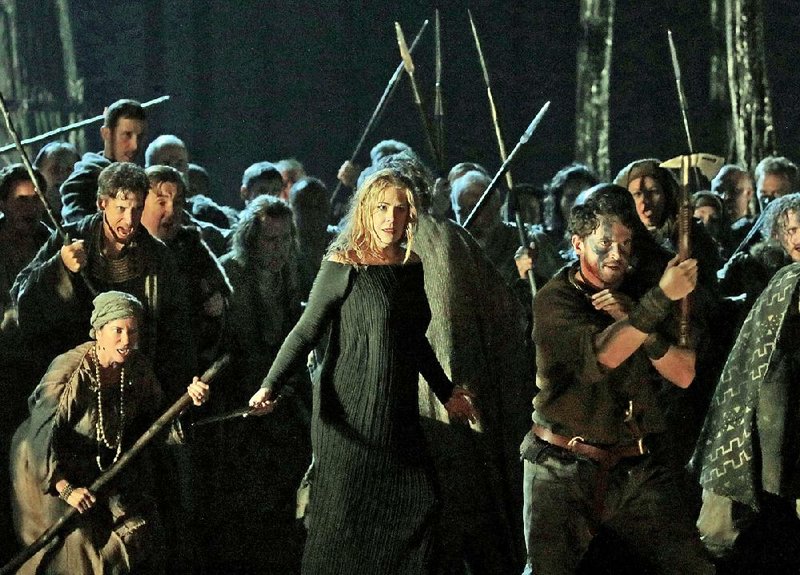Dear Otus,
Bradley Zimmer here from Marion. I wrote to you back in 2002 if you recall. It was after those Aggie scientists down in Texas cloned a cat. You said it was an abomination and a stench in the nostrils of God. I have another problem now.
As with most of your readers, I'm suffering Game of Thrones withdrawal. Who knows when that masterpiece will be back?
And with Vikings now on hiatus, I was at a loss as to where I'd get my weekly dose of blood, guts and intrigue until I stumbled across this swell new series on PBS Friday night right after it was beginning. It was some sort of musical in a foreign language. Fortunately there were subtitles.
What it was, Bradley, was opera. In fact, it was Great Performances at the Met: Norma. It's a classic by Vincenzo Bellini. And, as host Susanna Phillips said in the part you missed, "Norma is considered by many to be the Mount Everest of soprano roles."
There is, however, no mountain climbing scene. And the foreign language was Italian. Great Performances at the Met is hardly a new series, by the way. Norma kicked off the 12th season.
The show got off to a rip-snorting start with a gaggle of fierce looking warriors led by an older dude. They were creeping through the forest, waving swords, singing about Norma and trash talking the Romans.
The opera is set in a Blair Witch Project-esque grove in Gaul that's sacred to the druids and evidently one of the few places open enough to hold all the Sicambri warriors and their chief, Oroveso (who is also Norma's father). It's set in 50 BC along the Rhine River and the Romans are the hated occupying army.
High priestess Norma is played with soaring aplomb by accomplished soprano Sondra Radvanovsky.
After everyone leaves, these two Roman dudes wander in and start singing to each other.
That was Pollione and Flavio. Pollione, played by tenor Joseph Calleja, is the Roman proconsul, Norma's secret lover and father of her two boys who were born, astonishingly, in secret. Calleja is a beefy guy described by one critic as "more convincing as a lover than a warrior."
Pollione must also be one silver-tongued devil because in this passage we learn that he has traded in Norma for a younger model, the sweet and naive novice priestess, Adalgisa. She's played by mezzo-soprano Joyce DiDonato, who is the equal of Radvanovsky at this lofty operatic summit.
Then Norma comes in and calms everyone down and tells them to bide their time. She then does something with mistletoe and everybody wanders off. Later, the Roman and the cute blonde meet up in the grove and he asks her to come to Rome with him. She eventually agrees.
After that, the action switches to Norma's dwelling. Adalgisa comes and confesses she has fallen for a Roman and when Pollione saunters in, Norma realizes it's her erstwhile lover and goes all medieval on him.
After the halftime (I went to make a sandwich), Norma is anguishing around with a dagger and pondering whether to kill her sons.
This is one of the most wonderful scenes in the opera and, as one critic put it, "Radvanovsky brought tremulous poignancy to these aching phrases." But when Adalgisa comes in, they have a swell duet, sing it out, reconcile and become BFFs again.
Then the action switches back to the woods where the warriors are all hot and bothered and champing to get at the Romans. When word comes that the Roman honcho is still hot for the little blonde, Norma goes ballistic.
That would be the sylvan temple of Irminsul. A raging Norma then summons the warriors and proclaims, "Blood, blood! Revenge. War, destruction, slaughter!"
The warriors capture the Roman guy and ask Norma to sacrifice him, but she can't do it.
Viewers are treated to one last scene between Norma and Pollione where they vent their spleens in a stirring duet. Once the warriors are called back, Norma confesses how she broke her vows and will sacrifice herself on the pyre. The warriors sing, "We're frozen with horror."
Suddenly, Pollione sees the error of his ways and decides to join Norma in death. They walk toward the fire as the curtain comes down while Norma sings, "In the flames, in the grave, we will forever be one."
Until next time, Kalaka reminds you that hell hath no fury like a druid priestess scorned. If you want great music, put aside any plebeian philistine proclivities you may be harboring and try the visceral drama of opera. Your heart will soar and tears will probably be shed.
Disclaimer
Fayetteville-born Otus the Head Cat's award-winning column of
humorous fabrication
appears every Saturday. Email:
mstorey@arkansasonline.com

Disclaimer: Fayetteville-born Otus the Head Cat's award-winning column of 👉 humorous fabrication 👈 appears every Saturday.
HomeStyle on 02/03/2018
